Anka Leśniak
works
biography texts contact
2022
2021
2020
2019
2018
2017
2016
2015
2014
2013
2012
2011
2010
2009
2008
2007
2006
2004
WORKS 2022
The Birth of Venus
performance, objects
FNAF - Festival of Naked Forms
edition title: Nudity as a political gesture
Altenburg, Prague, Czech Republic, 2022
curator: Lenka Klodova
The visual aspect of the performance is inspired by Sandro Botticelli's painting *The Birth of Venus* and the myth behind it. According to this myth, Venus was born from sea foam. However, the commonly known version of her birth overlooks the circumstances surrounding the emergence of Aphrodite/Venus from the sea.
In truth, the goddess was created from the genitals of Uranus, which were thrown into the sea after he was overthrown by his son Kronos. The sea foamed, and from this foam, Venus emerged. In one version of the story, Kronos was persuaded to rebel against his father by Gaia, Uranus' mother and wife, who was oppressed by her husband.
Aphrodite/Venus embodies the concept of ideal femininity, but her origins are rooted in an act of violence. Thus, her meaning is complex. While Aphrodite was worshipped as the goddess of love in ancient Greece, her Roman counterpart, Venus, was also regarded as a patroness of warfare. Additionally, in Mayan culture, Venus was seen as the star of war.

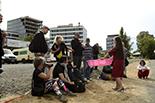

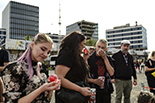
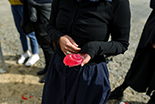
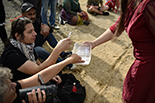
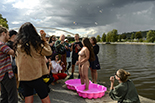
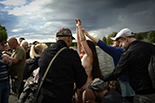
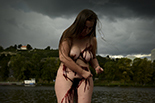
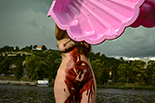
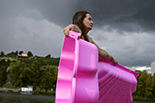
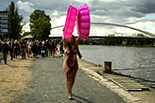
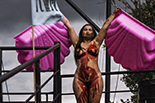
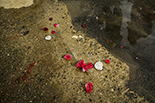
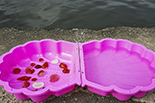
The performance engaged with the duality of the figure of Venus, exploring femininity that includes love, gentleness, and anger, as well as the capacity for fighting. This more aggressive aspect is often repressed in the socialization of girls, much like the circumstances of Venus' birth.
In the first part of the performance, I recited the myth of the birth of Venus. I then distributed handmade soaps to the audience—transparent ones and others in shades of red, along with soap bubbles. Some audience members soaped my body, creating foam, while others blew soap bubbles. I invited them to dry me, but without towels, they had to use whatever was available—such as scarves, handkerchiefs, or even their hair.
The climax of the performance illustrated the transformation from a figure embodying gentleness and passivity into one of rebellion and leadership for change. I drew a lightning bolt symbol on my body using red ink, referencing the symbol of Polish women’s fight for reproductive rights.
The use of a children’s pool shaped like a shell was significant as both a metaphor and a prop. Depending on my movements, it could evoke the shell from Botticelli’s painting, as well as symbolize wings or drums—representing the instruments of a battle march.